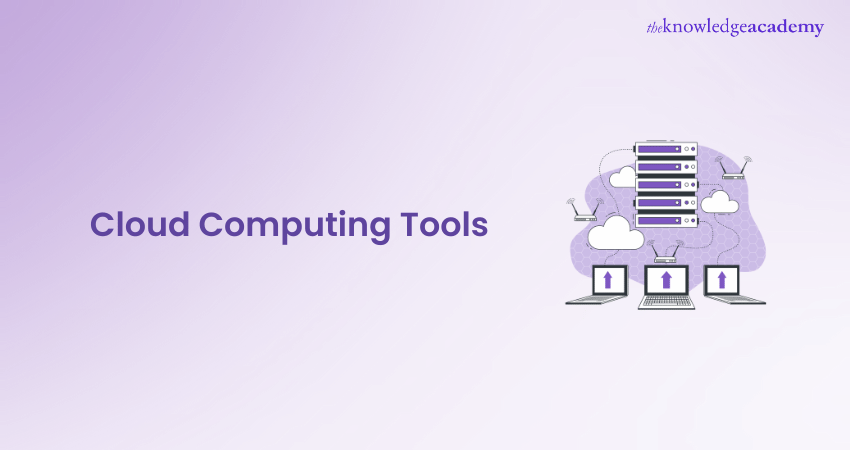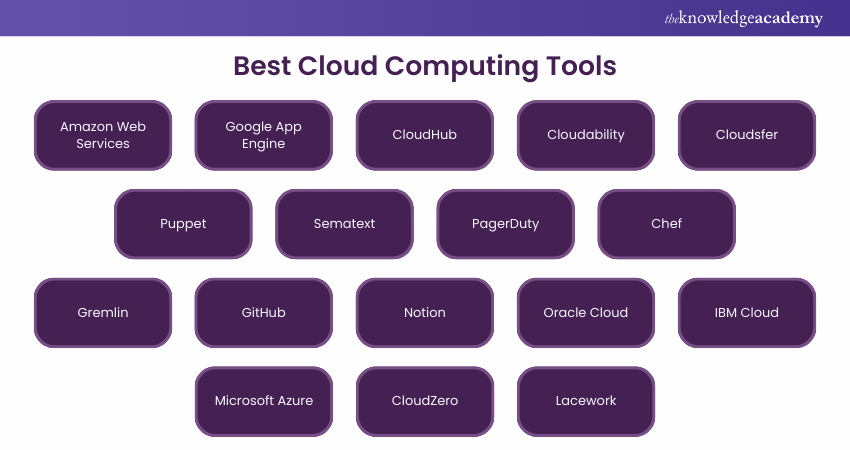We may not have the course you’re looking for. If you enquire or give us a call on +44 1344 203 999 and speak to our training experts, we may still be able to help with your training requirements.
We ensure quality, budget-alignment, and timely delivery by our expert instructors.

Cloud Computing has become the backbone of modern businesses in our tech-driven era. With the right tools, companies can store data securely, run applications smoothly, and manage costs effectively. This blog introduces you to some of the best Cloud Computing Tools available today.
From giants like Amazon Web Services to innovative newcomers like Notion, we discuss tools that can help your business succeed in the digital age. Whether you're a tech enthusiast or a business leader, these tools offer something valuable for everyone. So, let's dive into the world of Cloud Computing!
Table of Contents
1) What are Cloud Computing Tools?
2) Best Cloud Computing Tools
a) Amazon Web Services (AWS)
b) Google App Engine
c) CloudHub
d) Cloudability
e) Cloudsfer
f) Puppet
g) Sematext
h) PagerDuty
i) Chef
j) Gremlin
3) Conclusion
What are Cloud Computing Tools?
Cloud Computing Tools are special software and services that use the internet and remote servers to manage, store, and process data and applications. Unlike traditional computing, which is done on a single device, these tools connect to a network of servers in the cloud. They provide flexibility, scalability, and accessibility, letting users work and store information from anywhere with an internet connection.
Best Cloud Computing Tools
Cloud Computing Tools have revolutionised how businesses operate. From managing infrastructure to optimising costs, these tools offer different services tailored to various needs. Here, we explore some of the best Cloud Computing Tools available today.

1) Amazon Web Services
Amazon Web Services, commonly known as AWS, offers a comprehensive range of cloud services. It includes computing power, storage options, and networking capabilities. Businesses use AWS to host websites, store data, and run applications. It supports various programming languages and tools. AWS also provides advanced security features to protect data.
2) Google App Engine
It allows developers to build applications on Google’s infrastructure. Google App Engine automatically manages and scales your apps based on demand. You can select from several programming languages like Java, Python, and Node.js. The service integrates well with other Google Cloud services. It’s ideal for developers looking to focus on writing code without worrying about Server Management.
3) CloudHub
CloudHub is a cloud-based integration platform by MuleSoft. It helps businesses connect their applications, data, and devices seamlessly. The platform supports multiple integration patterns and has robust security features. CloudHub offers real-time analytics to monitor integrations. It simplifies the process of managing APIs and integrations.
4) Cloudability
It is a cloud Cost Management tool that helps businesses optimise their cloud spending. Cloudability provides detailed insights into cloud expenses across different providers. Users can create budgets and track costs in real time. The tool also offers recommendations for cost-saving opportunities. It’s designed to help organisations control their cloud budget effectively.
5) Cloudsfer
Cloudsfer is a cloud migration tool that facilitates transferring data between different cloud storage services. It supports over 30 cloud providers, including Google Drive, Dropbox, and OneDrive. The tool ensures a secure and efficient migration process. Users can schedule migrations and track their progress. It’s suitable for both personal and business data transfers.
6) Puppet
It is an open-source Configuration Management tool used for automating server setup and management. Puppet helps system administrators manage infrastructure as code. Puppet supports multiple operating systems like Windows, Linux, and macOS. It provides a reliable way to deploy applications. The tool also includes reporting features to monitor system configurations.
7) Sematext
Sematext offers monitoring and log management solutions for cloud and on-premises environments. It helps companies monitor the performance of their applications. The platform provides real-time alerts and detailed reports. Sematext supports integration with various services like AWS, Docker, and Kubernetes. It’s designed to improve the reliability and performance of your systems.
Learn the skills for easy troubleshooting with our Microservices Architecture Training – Join today!
8) PagerDuty
PagerDuty is an Incident Management tool that helps teams respond to issues quickly. It integrates with various monitoring and ticketing systems. PagerDuty provides real-time alerts and on-call scheduling. The tool helps reduce downtime by ensuring the right people are notified of incidents. It also offers analytics to improve response times.
9) Chef
It is a configuration management tool used to automate Infrastructure Management. Chef helps organisations manage servers and applications in a scalable way. Chef uses a domain-specific language called Ruby to write configuration scripts. The tool supports multiple cloud providers and operating systems. It’s designed to improve efficiency and reduce manual intervention in system administration.
10) Gremlin
Gremlin is a chaos engineering tool that helps businesses test the resilience of their systems. It allows you to simulate various failure scenarios in a controlled environment. The tool helps identify weaknesses and improve system reliability. Gremlin supports different Cloud Computing Platforms like AWS, Kubernetes, and Docker. It’s used to build more robust and fault-tolerant systems.
11) GitHub
GitHub is a web-based platform for version control and collaboration. It allows developers to host code, manage projects, and collaborate with others. GitHub supports Git, a popular version control system. The platform provides features like pull requests, issue tracking, and wikis. It’s widely used in the software development community.
12) Notion
Notion is an all-in-one workspace for notes, tasks, and collaboration. It allows users to create and organise content in a flexible manner. Notion supports integration with various tools like Google Drive and Slack. It offers templates for different use cases, such as Project Management and personal planning. The platform is suitable for both individual and team use.
13) Oracle Cloud
It offers an extensive suite of cloud services, including computing, storage, and networking. Oracle Cloud supports various enterprise applications and databases. Oracle Cloud provides advanced security features and compliance certifications. The platform is designed to support large-scale business applications. It also offers tools for managing and monitoring cloud resources.
14) IBM Cloud
It provides different cloud services, including AI, IoT, and blockchain. IBM Cloud supports multiple deployment models like public, private, and hybrid clouds. IBM Cloud offers robust security and compliance features. The platform integrates well with other IBM services and tools. It’s suitable for businesses of all sizes looking for scalable cloud solutions.
15) Microsoft Azure
It is a Cloud Computing platform offering different services, including Virtual Machines, databases, and AI tools. Microsoft Azure supports various programming languages and frameworks. Azure provides advanced security and compliance features. The platform integrates well with Microsoft products like Office 365 and Windows Server. It’s used by businesses to build, deploy, and manage applications.
16) CloudZero
CloudZero is a Cloud Cost Management tool that helps businesses control their cloud spending. It provides detailed insights into cloud costs and usage. The platform offers real-time cost monitoring and alerts. CloudZero helps identify cost-saving opportunities and optimise cloud expenses. It’s designed to support financial planning and operational efficiency.
17) Lacework
Lacework provides cloud security solutions, including threat detection and compliance. It helps businesses secure their cloud environments and applications. Lacework offers real-time monitoring and alerts for security incidents. The platform supports various cloud providers like AWS, Azure, and Google Cloud. It’s designed to improve the security posture of cloud infrastructure.
Learn the basics of Cloud Computing with our Cloud Computing Training – Join today!
Conclusion
Cloud Computing Tools offer a variety of solutions to enhance business efficiency, flexibility, and security. From storage and application hosting to Cost Management and integration, these tools cater to diverse needs. By leveraging the best Cloud Computing Tools and exploring Cloud Computing Examples, businesses can minimise costs and ensure data safety. As technology evolves, adopting these tools will be important for staying competitive in the digital world.
Elevate your job prospects with our OpenStack Administration Training – Join today!
Frequently Asked Questions
What are the Common Uses of Cloud Computing?

Cloud Computing is used for data storage, allowing users to save files and access files from anywhere. It also supports running applications and hosting websites, providing scalable resources as needed. Additionally, businesses use Cloud Computing for backup and disaster recovery to protect their data.
Which Technology is Used in Cloud Computing?

Cloud Computing relies on Virtualisation technology. It allows different Virtual Machines to run on a single physical server. It also uses advanced networking technologies to connect these Virtual Machines and enable seamless data transfer. Cloud providers implement robust security measures and encryption to protect user data.
What are the Other Resources and Offers Provided by The Knowledge Academy?

The Knowledge Academy takes global learning to new heights, offering over 3,000 online courses across 490+ locations in 190+ countries. This expansive reach ensures accessibility and convenience for learners worldwide.
Alongside our diverse Online Course Catalogue, encompassing 19 major categories, we go the extra mile by providing a plethora of free educational Online Resources like News updates, Blogs, videos, webinars, and interview questions. Tailoring learning experiences further, professionals can maximise value with customisable Course Bundles of TKA.
What is the Knowledge Pass, and How Does it Work?

The Knowledge Academy’s Knowledge Pass, a prepaid voucher, adds another layer of flexibility, allowing course bookings over a 12-month period. Join us on a journey where education knows no bounds.
What are related Cloud Computing courses provided by The Knowledge Academy?

The Knowledge Academy offers various Cloud Computing Courses, including Cloud Computing Training, Terraform Training and Microservices Architecture Training. These courses cater to different skill levels, providing comprehensive insights into Essential Cloud Engineer Skills.
Our Cloud Computing Blogs cover a range of topics related to Terraform Training, offering valuable resources, best practices, and industry insights. Whether you are a beginner or looking to advance your Cloud Computing skills, The Knowledge Academy's diverse courses and informative blogs have you covered.
Upcoming Cloud Computing Resources Batches & Dates
Date
 Amazon AWS Keyspaces Training Course
Amazon AWS Keyspaces Training Course
Fri 28th Mar 2025
Fri 23rd May 2025
Fri 25th Jul 2025
Fri 26th Sep 2025
Fri 28th Nov 2025






 Top Rated Course
Top Rated Course



 If you wish to make any changes to your course, please
If you wish to make any changes to your course, please


